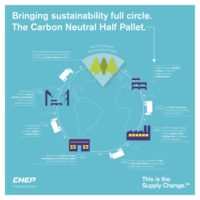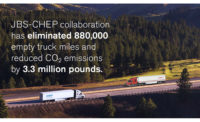Gardening is good for the environment. The more plants, the more carbon dioxide is removed from the air. However, when gardeners in Canada crowded into Walmart one summer, they left a costly environmental issue behind—empty wooden racks where the plants had been shelved and displayed.
Walmart, Bentonville, Ark., asked vendors to come pick up the racks, but experienced limited success. As plant sales increased and wooden waste piled up, workers at stores across Canada struggled to break down and dispose of the racks.
To quickly address the challenge, Walmart reached out to CHEP’s on-site experts. Was there any way the retailer's trucks, which were already at the stores from their distribution centers, could be used in recycling the plant racks?
Absolutely. Working closely with operation managers at Walmart's 400 Canadian stores, CHEP, Livonia, Mich., developed a reverse logistics and waste diversion solution to quickly and efficiently move all the excess racks to a recycling facility. As a result, this solution helped improve health and safety for store associates, reduce waste disposal costs and positively impact waste diversion metrics.
“Like many of our clients, Walmart has an aspirational goal of zero waste across global operations. When they asked CHEP for help, we were able to immediately implement a sustainability solution with multiple environmental benefits,” says Paola Floris, president, CHEP Canada.
Since the recycling of wooden waste began, more than 2,000 tons of plant racks have been transported to recycling facilities. Because the plant racks are built from pallets, the recycler rescues solid pallets for re-use, and turns the remaining wood into chips and sawdust, which is then sold as bedding for farm animals.
This approach has become a best practice, with Walmart also picking up and recycling other wooden debris. In addition, the retailer implemented a similar solution for dozens of its large warehouse stores in the United States.
Reducing, re-using and recycling are key steps in creating a circular economy, powered by a circular supply chain that produces zero waste.
As a result, Walmart customers achieve outstanding sustainability benefits each year by sharing and re-using such platforms, including:
- 2.3 million tons of CO² never enter the atmosphere, equivalent to removing more than 485,000 passenger vehicles from U.S. roads.
- 1.3 million tons of waste never make it to landfill.
- 3 million less miles in customers’ empty transport lanes.
- 1.4 million trees remain on the planet.
- 3,000 fewer tons of food are damaged during transport.



